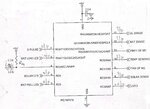vinay bs
Member level 3

- Joined
- May 22, 2012
- Messages
- 65
- Helped
- 0
- Reputation
- 0
- Reaction score
- 0
- Trophy points
- 1,286
- Activity points
- 1,751
sorry...please completely ignore first version codes.....
I am using channel 0(ol sense) and channel 6(solar sense) for input in second version of code... and i am right justifying the bits for easy calculations....
so adcon0 for channel 0 is 80 and
adcon0 for channel 6 is 98......
and i am using internal clock frquency of 4M Hz....
so clock conversion should be 1.6us.... so i choose 8Tosc...
then adcon1 becomes 0x10;
I am using channel 0(ol sense) and channel 6(solar sense) for input in second version of code... and i am right justifying the bits for easy calculations....
so adcon0 for channel 0 is 80 and
adcon0 for channel 6 is 98......
and i am using internal clock frquency of 4M Hz....
so clock conversion should be 1.6us.... so i choose 8Tosc...
then adcon1 becomes 0x10;



